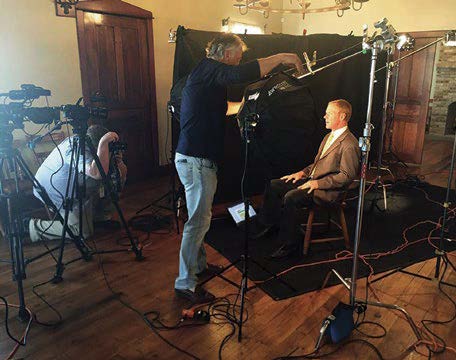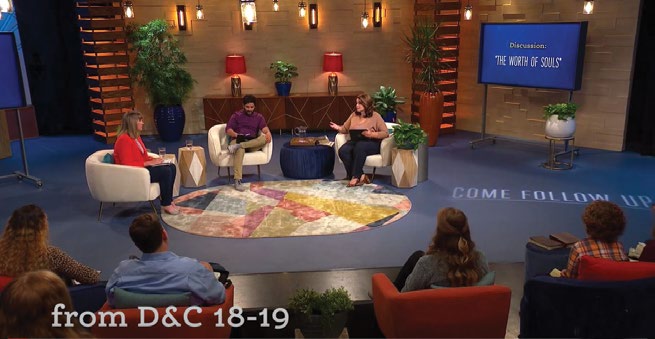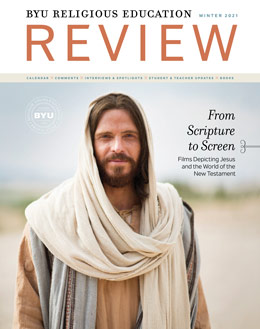Multimedia Resources Tell Restoration Story
Carmen Cole
Carmen Cole (carmen@byu.edu) is a designer at the Religious Studies Center.
Lights! Camera! Action! Exciting things are happening in the world of Religious Education multimedia. From TV programs that discuss the gospel in a talk show-type atmosphere to informative podcasts and scholarly online videos, Religious Education faculty are “preparing the way of the Lord” (Doctrine and Covenants 34:6) through multiple multimedia resources. Here is just a sampling of good things to come.
Foundations of the Restoration Videos
When Religious Education changed its core curriculum a few years ago, Alex Baugh, professor and chair of Department of Church History and Doctrine, saw the need for more and newer multimedia resources. Baugh has been heading production since last year on Church history videos to supplement in or out of class instruction for the Foundations of the Restoration religion class (REC C 225). Foundations of the Restoration is a required religion course for all BYU students, and Baugh wants students to have the best learning experience possible, and media can be a powerful component to help students learn and feel.
“The nature of our learning is so different today,” he says. “I think students expect a visual experience. It’s what they enjoy and how many of them like to learn.”
Religious Education received a generous endowment to make various types of multimedia for teaching purposes, and Baugh moved forward by creating a list of video topics that would supplement the Foundations of the Restoration class curriculum. The videos are filmed and produced three at a time and feature three or four faculty in each. Twenty-five videos are planned, each to be about twenty minutes long. Sixteen have been completed and are available for anyone to view online through the RSC website.
 Glenn Rawson and Dennis Lyman, video producers for Foundations of the Restoration video production. Courtesy of History of the Saints, Inc.
Glenn Rawson and Dennis Lyman, video producers for Foundations of the Restoration video production. Courtesy of History of the Saints, Inc.
“When I started teaching at BYU we didn’t have any of this kind of media,” Baugh says. “There was very little media that could supplement teaching.” Now, students are able to watch a particular video in advance of class to prepare for the upcoming class lecture and presentation. In his class, Professor Baugh has his students summarize in writing what they learned from the video, what was new, and what they understand now that they didn't know before.
Baugh reads all of the students’ responses. “I think it's a great aide for teaching,” he adds. The videos help students “learn, understand, and feel more deeply the things of the mind and the feelings of the heart.”
The best part about the videos? “While they are meant for our students, we’re glad to share them with everybody,” Baugh said. He is convinced that we will “flood the earth,” as Church President Ezra Taft Benson (1899–1994) foresaw, not only through printing and publishing the Book of Mormon and preaching the restored gospel, but through the use of online media. “Somebody in the Netherlands, or Australia, or anywhere else in the world who is interested in learning about the Restoration can access the videos because they are on the RSC website. Gospel doctrine teachers can view them to help them prepare for their Come, Follow Me lessons. Seminary and Institute instructors are free to use them in their classes. We hope that church members, or anyone else for that matter, will watch them as well. We’re more than happy to share,” he says. The episode titled “What Makes a Revelation? The History of the Doctrine and Covenants” is scheduled to air on KSL-TV at 9:30 a.m. before general conference on Saturday, April 3, 2021. The Foundations of the Restoration videos are available online at rsc.byu.edu/
Roundtable Scripture Discussions
“Roundtable Scripture discussions usually consist of four Religious Education faculty members discussing various scriptural passages from a specific book of scripture: Book of Mormon, Pearl of Great Price, Doctrine and Covenants, [or] Old and New Testament,” says Gaye Strathearn, professor of ancient scripture. The faculty sit together around a table to discuss the topics—a common method for academic discussion—and the practice hence offers the series its name, Roundtables.
“Initially I participated in some of the early discussions on the Old and New Testaments and the Book of Mormon,” Strathearn says. “When Religious Education decided to do some episodes on the new cornerstone classes, we decided to start with the Teachings and Doctrines of the Book of Mormon [class]. I was the associate department chair and was asked to take responsibility for the new episodes. We used some of the topics taught in the class as the basis for our discussions. I invited faculty who were interested in participating to sign up for the topics that they would like to discuss, and then I tried to find combinations of faculty who had different strengths and interests that would complement each other.” Strathearn also found artwork to enhance each video episode and reviewed each episode “many times for accuracy.”
These videos used to air exclusively on KBYUtv but are now available online at rsc.byu.edu/
Y Religion Podcast
“The Y Religion Podcast is a podcast that brings some of the published research and writing of the BYU Religion faculty to the everyday Saint,” says Anthony Sweat, executive producer of the Y Religion podcast and associate teaching professor of Church history and doctrine. “Each year, BYU religion professors publish hundreds of studies that deal with subjects related to the Church, but many students and Church members never learn from them as these are published in a variety of journals and presses and venues. This podcast brings this research into one place to enlighten the everyday seeker of truth. In each episode we discuss why the study was done, why it matters, and why the professor chooses faith.”
Sweat, a regular podcast user, realized a few years ago that podcasts, with their “engaging format,” could also be utilized to share the religious scholarship of BYU faculty with the world. He created a few demos, submitted a proposal, and received the “backing and green light to move forward and form a committee.” The faculty members on the committee—Ryan Sharp, Casey Griffiths, and Brad Wilcox—conduct the interviews for the podcasts. Sweat acts as host for each podcast, and BYU students record, edit, and mix the audio. About the podcast, Sweats admits, “I love it. I am a teacher and one who likes to use any medium to reach and teach learners, and this is a fun and growing medium to do so.”
The Y Religion podcast is growing in both popularity and number of listeners. “More and more people listen all the time, into the tens of thousands monthly,” Sweat says. “The podcast has even charted in the top 100 religion podcasts in America a few times. It is engaging. It is enlightening. And it is edifying. The work of my colleagues in BYU Religious Education is top-notch and fabulous, and this is a free, easy, accessible way for you to enjoy their research and insights as you work around your home, drive, or even exercise! I think this podcast is the very definition of seeking learning by study and also faith. You won’t be disappointed.”
The Y Religion podcast is available on all major podcast platforms, including Apple, Spotify, Google, Pandora, and Stitcher. You can also play it directly from the web. Just Google “Y Religion Podcast,” go to yreligion.byu.edu , or visit rsc.byu.edu/
Come Follow Up
 Left to right: Stephanie Dibb Sorensen, Daniel Becerra, and Barbara Morgan Gardner on the set of Come Follow Up.
Left to right: Stephanie Dibb Sorensen, Daniel Becerra, and Barbara Morgan Gardner on the set of Come Follow Up.
When BYUtv wanted to create a weekly TV show to “help viewers engage more deeply and meaningfully with the scripture readings in the Come, Follow Me curriculum,” they didn’t need to look any further than the faculty in BYU Religious Education. Barbara Morgan Gardner, associate professor of Church history, and Daniel Becerra, assistant professor of ancient scripture, are the moderators on BYUtv’s Come Follow Up.
“Each week on the show our discussion centers on the [Come, Follow Me] scripture block for that week,” says Becerra. “The idea is that we come together to ‘follow up’ on what we have learned and to discuss the questions that we have. We also have a special guest each week who has unique training or life experience relevant to what we plan to discuss.”
“The program is unique in that it offers a platform for a diversity of voices (both in the studio and at home) to participate in gospel teaching and learning,” he adds. “The show is founded upon the assumption we all have something to contribute to help [one] another come unto Christ.”
Becerra initially balked at the idea of being a moderator on the show—he isn’t, after all, an actor. But BYUtv assured him that they wanted normal people who could talk authentically about the gospel. “Normal I can do,” he says. “Also, I am committed to the notion that discipleship can look different, so a project which recognized the value of diverse voices for gospel learning appealed to me.”
Becerra appreciates the opportunity to work both with his co-moderator Gardner and the guests on the show, and recognizes how much he learns from them. He says the best part about being a moderator is “learning from our guests, and not just the weekly ‘specialists.’ I have been surprised at how consistently our youngest members of the audience (sometimes as young as seven or eight) have such wise insights. I also love hearing the testimonies of persons from such diverse walks of life.”
Come Follow Up airs every Sunday at 1 pm ET/
